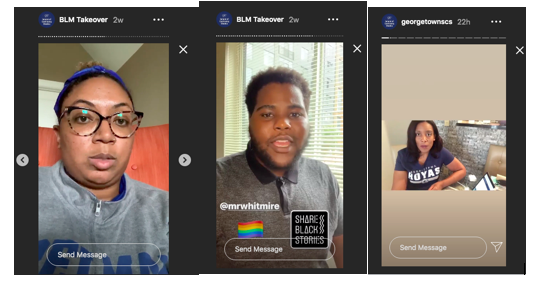In last week’s post, I noted that there are many prongs in the racial justice movement. Concrete action for change, and not just “talk,” must be the priority of the work. In order to make that shared action possible, however, it is important to recognize the ways in which racism consciously and unconsciously shapes social structures and informs how white people understand and relate to Black people and other people of color. The long-haul work of dismantling racist structures demands a recognition of Black voices and experience that the dominant narratives in our shared spaces too often de-center and ignore. Raising consciousness and awareness about Black voices and stories is an important component of racial justice.
This week I want to highlight four examples at Georgetown in which the university has utilized its digital platforms to promote the work of racial justice by highlighting and honoring the reality of Black experience.

First, SCS leveraged its effectiveness with social media by inviting Black students and alumni to share their reflections about racial injustice in a series of Instagram Stories, including Instagram Takeovers (You can access the stories here). These Instagram Stories amplify the voices of SCS students and alumni who are powerfully using their professional roles to advocate for justice and empowerment of people of color. In one Instagram story, Lauren Strayhorn, an alumna of the Master of Professional Studies in Integrated Marketing Communications, who works in digital marketing for Deloitte, reflects on how a Georgetown education prepared her to commit to creating authentic spaces for Black women through a digital newsletter that she created:
“It is important to be in spaces and places that encourage authenticity and uphold similar values and traditions that I honor and cherish where I can be who I am as I am. The Jesuit value of Educating the Whole Person embraces an understanding of one’s experience within and outside the classroom environment … I didn’t see myself in the news that I was reading and I created Notedd (a digital newsletter offering perspectives of ambitious women of color) for those who were also struggling.”
Second, Georgetown organized this week an “Interfaith Prayer for Lament, Healing, & Justice” in Dahlgren Chapel. With chaplains and staff participating from the many faith traditions represented at Georgetown, along with President DeGioia, the solemn gathering affirmed the university’s commitment to Contemplation in Action. Prayers offered up from across the religious traditions pointed to the need for sustained action to realize a racially just community. Reverend Ebony Grisom, Protestant Chaplain, prophetically noted that the tradition of lamentation precedes truth-telling and authenticity. Reverend Grisom called this community to bring about an alternate future where anti-Black violence no longer steals God’s Glory: “We lament the world as it is and long for what it should be.”

Third, Georgetown launched “Georgetown Community Continues Quest for Racial Justice,” a centralized page highlighting the many ways, through teaching, research, artistic expression, advocacy, and activism, that “members of the Georgetown community seek racial justice.” Hopefully this site can serve as a platform for Georgetown students, staff, and faculty to research and learn about how people of color are negatively impacted by racism embedded in intersecting social structures, like housing, education, and health.
And finally, Georgetown University’s president announced yesterday that the University will officially observe June 19, 2020—Juneteenth—as an official University holiday this year, and annually. This recognition is a long time coming and is an important day to honor the millions of African people who were enslaved, and to acknowledge and reflect on the full promise of freedom. We must continue to work collectively to address the implications of enslavement and segregation that are still present today to ensure a more just future.
If you are looking for ways to practice racial justice consciousness in the ways you engage with social media, here are some resources to consider:
- National Museum of African-American History & Culture presents tools and guidance for Talking About Race;
- For parents looking to educate children through a Critical Race Lens, The Conscious Kid offers some Black and Brown owned books; and
- Parade Magazine curates a list 25 anti-racist Instagram accounts to follow for listening, learning, and action-taking
